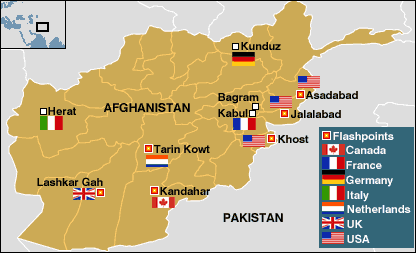 There are some good things coming out of the Riga NATO summit. We will have to wait and see the walk after the talk - but the trends are in the right direction.
There are some good things coming out of the Riga NATO summit. We will have to wait and see the walk after the talk - but the trends are in the right direction.Nato leaders at a summit have hailed the relaxation of curbs on deployment of some members' troops in Afghanistan.I know, I know. That still leaves over a third of your troops (the Combined Joint Statement of Requirements (CJSOR) is still not filled) only partially usable. The Dutch are a major player with over 2,000 - but you will never win Afghanistan with the Romanians, Solvenes, and Luxembourgese. It is critical that they will do that. Leading from the front - even little Luxembourg (fought with us in Korea, BTW) can look with distain at the Fwench. That is the right noise, but not a total victory.
Nato commanders say they believe they can move an extra 2,500 troops around the country now some smaller members have relaxed their mission conditions.
...
Nato chief Jaap de Hoop Scheffer welcomed the relaxation of "caveats" on deployment in Afghanistan.
He said about 20,000 of the 32,000-strong Nato force were now more usable for combat and non-combat missions.
"We have made real progress on caveats," he said.
...
Those agreeing to ease the restrictions on deployment against the Taleban include the Dutch, Romanians and smaller nations such as Slovenia and Luxembourg.
The Axis powers, fellow Fascist traveller and their lacky are still balking, though heading in a better direction.
France, Germany, Spain and Italy have said they will now send help to trouble zones outside their areas, but only in emergencies.That being said (I know I was being mean to our allies - but you should hear what the Canadians have been calling them), there are positive moves.
The summit also saw several countries offer additional troops and training teams, while France agreed to send more helicopters and aircraft.Yes, the friends are getting along better now - but there are still some sharp elbows being thrown about
UK Prime Minister Tony Blair told the BBC the summit had made significant progress towards generating enough force to defeat the Taleban, but they still "need to make those last remaining steps".Prior to Riga, The Economist gave a solid overview of the incredible importance of what is going on between the better hotels in Latvia and the working dinners.
But a foreign office minister was more critical of the effort.
"This view seems to say it's all right for British soldiers to die in defence of the West but it's not all right for other soldiers," Kim Howells said.
For some NATO members it has been the most intense fighting since the Korean war. This year 49 soldiers, 34 of them Canadians, have been killed in NATO operations, and a further 14 British servicemen died in a plane crash. A few thousand Afghans—including Taliban, government forces and civilians—are believed to have died in the conflict.A solid read.
...
Andrew Krepinevich, director of the Centre for Strategic and Budgetary Assessments, a defence think-tank based in Washington, DC, says that Europe and America have reversed historical roles. “A hundred years ago America was like Europe today,” he argues. Europeans preserved the balance of power, and the British fleet protected trade, while America criticised military adventures, such as the Boer war, as immoral. “America got a free ride on the Pax Britannica. Now it is the Europeans who are getting a free ride on the Pax Americana,” he says.
Despite many predictions of its imminent death, NATO soldiers on. Other organisations can offer much but they cannot match NATO's military power. This is why so many countries still want to join the alliance: it offers an insurance policy in uncertain times, with its promise of protection by the world's superpower.









No comments:
Post a Comment